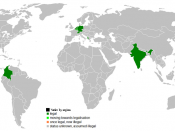The Answer to a Death Wish? Akash lies on a hospital bed. This twenty-two year old boy is in a coma and has a recovery rate of less than one-tenth of a percent. Even if he does come out of the coma and starts breathing on his own, he will never return to his original self and will live the rest of his life as a cripple. Meanwhile having no insurance, his parents have spent most of their money on keeping him alive for a week. They are a desperately hoping for a miracle. A miracle, which will never happen. Even if the miracle does come is it better for Akash and his family or does it just start a long road of misery for them? Lets suppose Akash does come out of the coma, and then he will live the rest of his life as a cripple. Every time his parents see him they will be worried about their son's future.
In such a situation is it right for the government to mandate that Akash has to be kept alive? What if Akash himself doesn't want to live on recovering? Does the government have a right to stop him from committing suicide? In most countries there are legislations, which give the government the right to prevent people from carrying out their own free will in regards to euthanasia.
In recent times the issue of euthanasia has been a controversial one. I think the entire issue stems from how we define life. Is a person deemed to be alive if one simply breathes? Is a coma patient that is living the life of a vegetable said to be living or dead? If there were no costs to keeping the person alive then this would not even be an issue. However, families have to spend a fortune on life support systems. Not all of these families can afford such a cost. Besides in many instances someone on life support systems does not want to continue an inconsequential existence. A person whose natural breathing has stopped and is being kept alive on a respirator can be technically said to be alive. But, naturally speaking all his organs are "dead"ÃÂ. Machines are carrying out the functions that the organs would normally carry out. In this case the machine can be said to be in existence, and not the person himself.
Does a country, in such a situation, have the right to stop a person from carrying out his free will on moral grounds? People will say it's the duty of the government to stop such actions because God gives life and no individual has the right to take his own life away. This argument is clearly a theological one and has no legal merit. A democracy is not based on Christianity, Hinduism or Islam it is based on rights and duties. No government should have the right to take away freedom of action from its citizens. As long as that person is not harming anybody except himself the government should have no jurisdiction over the matter. If we let the government encroach onto some of these rights we might as well declare ourselves slaves of a government and not citizens of a democracy.
"It's my right"ÃÂ has become a rallying cry in this century, relating to almost any matter from human rights to the right to even a holiday. Some very basic rights in the area of life and death are being claimed. A person's right to life itself is one with which we mostly have no argument; many of us regard a person's right to a life and the "right to die"ÃÂ equally important. Death is seen not merely as an inevitable consequence of human mortality or as a something under divine control, but as something to be desired and demanded by people for themselves and for others under certain circumstances. The government does not in any way control these basic rights and wants of its citizen's and cannot do anything under its power to prevent people from dieing at their own will.
I would agree that if a person is naturally dead and is being kept alive artificially, then the doctors have to make a judgment call. They have to weigh the chances of the patient ever becoming normal again. They have to consider whether keeping him alive in the form of a mere vegetable is worth the pain and torture that he is experiencing. The doctors play a crucial role in this decision, especially if the patient himself is not in the right frame of mind to make the decision. It might actually be comforting for the doctor to know that he had done the last thing he could for his patient. He had tried to cure, then to ameliorate symptoms; and at last either advised or complied with the patient's or relatives' last wish. Suicide is no longer a criminal act in Britain; why should assisting someone's suicide, or enabling death when the patient (due to frailty, paralysis or coma) cannot perform it, be a criminal act? After all, how far can medical science go to reverse the natural process? Arguments presented by the detractors of euthanasia are a mixture of legal and theological issues. Until somebody can prove to me otherwise, I think that euthanasia should be legalized after taking into consideration the patient's will and the fact that a right to die depends on perception of the quality of the life now lived as worse than being dead. Is this irrevocably and always true for such people who want to be killed by euthanasia? We must bear in mind that death is final: There is no way back if someone were to discover that life was better after all!





